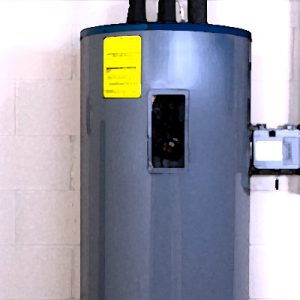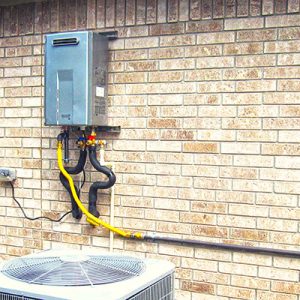Hot water heaters are an important part of your home’s plumbing system. Today we will cover a few basics that you need to know about water heaters. Read on if you are interested in learning about how these heaters work, as well as their installation, repair, and maintenance. First, we will discuss a few different models of water heaters including tank-less water heaters, and their application.
How Traditional Hot Water Heaters Work
Unless you live near a hot spring, water comes into your house cold. To make this water hot enough for washing dishes, washing your hands, or taking a shower/bath, it must pass through a water heater. The traditional water heater is a big metal cylindrical tank. The tank fills up with water, and inside there is a heating element. Usually, the heating element resides at the bottom of the tank.
When water is heated at the bottom of the tank, it rises to the top, where it can immediately be used for showers or other applications. This process of “heat rising” is what allows the water heater to always deliver hot water to your taps and showers. These systems are not as efficient as modern water heating methods, but there are a variety of tricks to conserve hot water eliminating some of the waste inherent with this outdated design.
Understanding Modern Tankless Water Heaters
Over the years, new technology and innovation have led to the creation of what is now called tankless hot water heaters, also referred to as on-demand hot water heaters. As the name suggests, these devices only heat water when it passes through the device. Since there is no tank, the heater activates once it determines water is passing through it via means of a high-tech computer-controlled system. A heat exchanged quickly heats the water up to a predetermined temperature before shutting off to stop the water from becoming too hot.
The ability to heat only water that is required has led to an incredibly high efficiency from these water heaters (some in excess of 95%), saving people money and reducing excess energy consumption. With the obvious benefits of tankless water heaters it’s no surprise that the majority of people are moving to these systems.
Water Heater Installation
Water heater installation should only be done by certified professional plumbers. The reason is that an improperly configured unit can explode due to failure of the pressure relief or shut-off valves. The area that the heater is installed in must have a water line to feed cool water into the heater and be connected to a hot water plumbing system. Once installed, the thermostat should be tested and calibrated, as well as the pressure relief valve and shut-off valves.
Water Heater Repair and Maintenance
 Again, it is important to use trained professionals to conduct any water heater maintenance tasks. As mentioned above, water heaters can explode when not properly maintained. This is why it’s important to have your heater inspected yearly; most water heaters don’t last longer than a decade and there are many that are on the verge of failing. Some last a bit less than a decade, some a bit longer. If your water heater is leaking, you should call a plumber that is certified in water heater repair to come and take a look at it.
Again, it is important to use trained professionals to conduct any water heater maintenance tasks. As mentioned above, water heaters can explode when not properly maintained. This is why it’s important to have your heater inspected yearly; most water heaters don’t last longer than a decade and there are many that are on the verge of failing. Some last a bit less than a decade, some a bit longer. If your water heater is leaking, you should call a plumber that is certified in water heater repair to come and take a look at it.
Common Water Heater Problems
Hot water is a modern convenience that we often take for granted. Running the tap to get hot water for cooking, those wonderful hot showers, and more are all dependent on our hot water tank.
But just like every other appliance, our hot water heaters can fail. Here are some common issues with water heaters, and how you can spot the cause of your cold water.
You Have No Hot Water
The biggest indicator that there’s something wrong with your hot water heater is a lack of hot water. It’s pretty easy to spot the symptom, that is, cold showers, etc., but the actual problem could be much more significant. If you find that your hot water is more tepid than you prefer, then there are a few places you can check to see what’s the problem. But contrary to what you may think, your first stop shouldn’t be your hot water heater, it should the circuit breaker to check if it tripped. Your water heater could be fine, it’s your electrical system that can’t handle the problem.
Picture this: Early one cold morning, your alarm goes off. You pull yourself out of bed and head for the shower, turning on the hot water. Half-asleep, you wait for the water to warm while following your morning routine. Now ready for your shower, you reach out and check the water. It’s freezing cold. That is when most clients call us for water heater repairs.
This is often seen with old, improperly maintained gas water heaters.
First off, check to see if the pilot light is lit:
- If the pilot will not light, or does not stay lit, the thermocouple has probably failed. Turn off the gas line and schedule a thermocouple replacement as soon as possible.
- If the pilot light is working fine, the thermostat has probably failed and needs to be replaced.
Water is moved from the heater to faucets through hot water lines. If it’s taking a long time for the hot water to arrive at a faucet, it is usually because either:
- The pipes are cold. Make sure that your hot water lines are insulated. This is especially important in preparing your system for a Toronto winter.
- The faucet is a long distance from the heater. Consider installing a recirculation system to provide instant hot water all over your home.
There’s Not Enough Hot Water
If your shower seems to be getting cold long before you’re finished, then your hot water heater could have a few different problems. One could be the thermostat. Many hot water heaters have a thermostat that sets the temperature. A lower temperature could mean the water is heated up, but it isn’t getting enough energy to actually sustain longer use. So check your thermostat and see if it’s at the right level for the heater’s size and your heat preferences. Another problem could be the element itself, which could be suffering some electrical issues. In that case, you’ll need to call a professional to inspect your heater and suggest a fix.
It Takes A Long Time To Reheat Your Water
Just like the not enough water problem, your heater simply needs a thermostat adjustment to get the water heated to the right temperature at the right time. If that’s the case, experiment with the temperature and see if your water gets heated up faster. If that isn’t the case, more drastic measures that need a professional could be in order, like a faulty element or a poor reader on your heater’s capacity. You may also just want to consider an on-demand water heater.
Your Hot Water Smells Really Bad
Foul-smelling water usually has a single cause: bacteria build up. If your water is particularly foul, it’s probably time to flush your heater for a cleaning. This can take some time, so plan accordingly and try not to use any hot water in the interim. Bacteria-laced water can be harmful, so it’s best to avoid ingesting or using that water. If you need hot water, boil it for the recommended time first.
There are many different ways our hot water heaters can fail us, but that doesn’t mean we have to go without. By learning how to spot the causes of your hot water issues, you can get your water heater back to working condition. Remember to always heed all warnings on your water heater and to call a professional plumber if you ever are unsure or do not feel comfortable doing this work yourself.
Hot Water Heater Replacement
When searching for a water heater replacement, you should keep in mind that most tanks don’t last forever. You may want to consider a tank-less water heater, which may last a long time. Tankless models heat water as it passes through them, and are said to deliver an ‘endless stream’ of hot water. But do they? In practice, most lower-end tank-less heaters tend to run ‘hot and cold’. The reason is that the unit must gauge temperature differences to decide how much heat to apply. This can result in variations in temperature.
We hope that you were able to glean some knowledge from today’s post regarding hot water heaters. As a final word, we would like to make sure that everyone has water heater inspection on their annual maintenance schedule. Ignoring your unit is a sure way to leave yourself vulnerable to floods, water damage, and in a worst-case scenario even an explosion.
Signs Your Hot Water Heater Needs To Be Replaced
Hot water heaters are a necessary part of our everyday lives, whether you rent or buy them. They turn showers into moments of warm comfort, help us get dinner on the table faster, and just generally improve our lives. But many people don’t think about their hot water heater until it’s completely broken. But there are ways to check on your tank without waiting until the last possible second. Here are just three ways to know if it’s time for a new hot water heater.
The Water Temperature Is Low
This may seem like a no-brainer, but many people don’t actually think about their water’s heat and the water heater together. This may be a result of very slow degradation in water heat, just a couple of degrees here and there, so you simply get used to the water. It may also be a result of coming from a low water heat in your last place of residence. Whatever the reason, the maximum temperature of your water is a surefire way to know if the hot water heater is doing its job. And the best way to know is to turn on the hot water tap. The hot water should come quickly, and it should be too hot to run your hand under in relatively little time. If you feel you could stand in it, or it takes a long time to actually get hot, a new water heater may be in order.
Thousands of Toronto homes require water heater repairs due to cold weather damage. A lot of clients come to us seeking emergency plumbing repairs after the harsh winter has taken its toll on pipes, pumps, valves, and gaskets. Small problems develop as the temperature drops, often going unnoticed until there is a failure. Regular preventive maintenance and inspections could prevent most of the hot water catastrophes homeowners tend to experience around this time of year.
Water Heater Leaks and Puddles
Hot water tanks are, well, tanks filled with water, and that means you’ll need to check for leaks occasionally. Old or broken hot water tanks will leak. It may be just a little bit of water or it may be a lot, but any leak is one that needs to get fixed or replaced immediately. Not only does leaking cost you on your monthly water bill, but it can also ruin your basement and, in some scenarios, leak hot water all over your basement, reducing how much hot water gets to where it’s supposed to go. Check all the connections and the area around your hot water heater on a regular basis to see if there’s any water. If there is, get a professional in for an inspection. You may need to simply change the connections, but a new hot water tank may also be in order.
Water Heating Duration
If there’s one thing true of our world, it’s that we’re using more and more water. Homes that once had one bathroom for the entire family now have one or two more. People are using luxurious spa baths, and many older homes are getting divided into multiple occupancy rental units, driving up water use. One of the surefire things to get lost in the shuffle of bathroom renovations, kitchen renovations, and daily routines is the how water tank. Many people need an upgrade just to have the hot water they need for the entire family. If you’re finding that your showers are cut shot by sudden bursts of cold weather, then it’s probably time to get a high capacity hot water tank.
Other Water Heater Problems
- Scalding hot or lukewarm water is another case of thermostat failure, requiring replacement.
- Noisy operation or dirty water can be solved by having a professional drain and flush the tank.
- Rusty or leaky tanks require complete replacement.
- Overflowing heaters may require a release valve replacement.
If you end up requiring Toronto water heater repairs, you should have a qualified plumbing expert inspect the entire system. Many times, a single part breaks and starts a cascading failure effect. Do-it-yourself homeowners replace the single worn part and ignore the rest of the system until it fails again just down the road. I’d like to remind everyone that yearly inspections and preventive maintenance before winter is recommended for all homes, especially the older ones.
With these tips, you can have all the hot water you need and a tank that works for you and your family. But remember, getting a new hot water heater is a job for plumbers in the Toronto area. Always use certified plumbers for repairing or installing any new water heater.
Benefits of an On-Demand Hot Water Heater

External tankless water heater outside of the house
Hot water heaters are among the most energy-intensive appliances in the average home. Now, more people are switching to tankless, or on-demand, water heaters to save energy while enjoying an endless supply of hot water.
Although tankless water heaters might seem like a new invention to some homeowners in the United States, these appliances have been used for decades in other parts of the world. If you’re in the market for a new water heater, here are some of the biggest benefits of on-demand water heaters.
Smaller Than Conventional Hot Water Heaters
Because tankless hot water heaters lack storage tanks, they require less space. This paves the way for installing multiple heaters in homes that could benefit from it, such as when residents vary significantly in their hot water usage habits during the same times of the day. On-demand water heaters are available in whole-house models as well as specific faucet models.
The additional space made possible by choosing tankless water heaters is especially valuable in apartments, condos, and smaller houses where you’re fighting for as much storage space as you can find. For maximum space indoors, the on-demand water heater can be installed outside of the building, providing you even greater space in your home to store your belongings.
Better Water Quality
Clean water is vital for numerous activities around the home, but water from conventional heaters can be full of sediment, such as rust and limescale, that builds up in the tank over time. With an on-demand hot water heater, this is never a problem. Water that is heated in the appliance has just arrived and is passed on to its destination just as quickly.
This means that the hot water inside the home tastes better and is potentially safer for bathing and consumption, as it isn’t stored and doesn’t have the time to build up any sediment.
More Eco-Friendly and Efficient
As environmental concerns continue to grow, many homeowners become more conscious of their individual carbon footprint. Conventional hot water tanks waste significant energy due to constant heating of the water tank, with much of the energy used for heating your water going unused as heat energy transferring to the space around your traditional tank heater.
Fortunately, this issue was eliminated by an on-demand hot water heater. Only when faucets are turned on is the water heated by the tankless water heater, resulting in less energy consumption and an efficiency rating of nearly 99 percent. Tankless hot water heaters also produce less waste.
The majority of tankless heaters are manufactured from recyclable materials, a major improvement over conventional tank water heaters, which pile up in the landfills.
Tankless water heaters cost more than conventional ones initially, but they easily make up the difference in a number of ways. First, operating costs are bound to be lower and depend on hot water usage in the home. This translates to savings of up to one third for many homeowners. Installation costs can sometimes also be reduced thanks to federal tax credits. Finally, the home will have more value to buyers when it is time to sell if it has an on-demand water heater rather than a conventional one.
In addition to their other benefits, tankless water heaters may last up to 20 years, twice as long as the ten years of service normally expected from traditional tank water heaters. The water heater’s life span is affected by local water and the quality of the appliance itself. However, because no water is stored inside the appliance, there is less time for corrosion to occur, allowing the on-demand heater to service your family for years to come.
No Hot Water Interruption and Wait Time
Tankless water heaters are better for rental properties with many tenants, where multiple bathrooms are used simultaneously or showers are taken multiple times in a row on a daily basis. Tankless water heaters provide a constant flow of hot water. It is saving the inconvenience for your family and tenants besides saving energy costs in the long run.
By choosing tankless water heaters, consumers can enjoy more convenience for longer while saving money and helping the environment.





